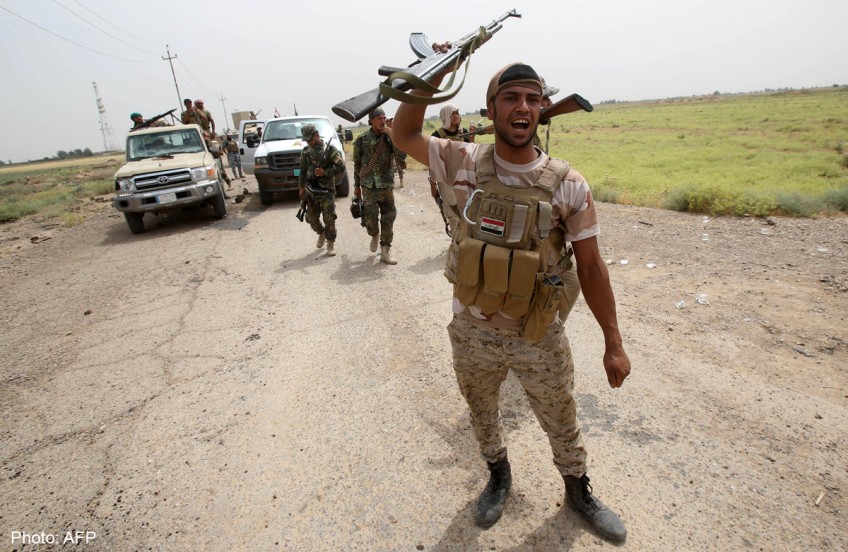Iraq allies vow support for bid to regain Ramadi from extremists

PARIS - Iraq's allies Tuesday pledged support for Baghdad's plan to retake the city of Ramadi from Islamic State extremists, whose advance Prime Minister Haider al-Abadi described as a "failure" for the global community.
The US-led coalition, which has been carrying out air strikes against IS, also called for the "speedy launch" of efforts to resolve the Syrian crisis, which it said was crucial to tackle the group rampaging through Syria and Iraq.
But despite a series of battlefield wins by IS, the coalition maintained it had a "winning strategy" and gave its seal of approval to Iraqi plans to claw back territory at crunch talks in Paris.
US Deputy Secretary of State Antony Blinken, standing in for the hospitalised John Kerry in Paris, hailed Baghdad's strategy as "the right plan both politically and militarily for Iraq at this time".
He insisted the coalition had made "real gains" and said the Islamic State now had 25 per cent less territory than when the air strikes began in August.
Experts, however, say the militant group nevertheless controls an area the size of Italy across Syria and Iraq.
Baghdad has been fighting to wrest back Ramadi, the capital of Iraq's largest province Anbar, since the shock loss to IS last month - the worst defeat for the coalition since it formed nearly a year ago.
Under the emergency plan adopted by Abadi's cabinet, Baghdad hopes to mobilise and arm the Sunni tribes of Anbar province, which they have previously been loath to do out of fears they could turn on the Shiite-led government.
Abadi also plans to ensure all Sunni and Shiite militias are operating under the government's authority, to avoid stoking sectarian tensions.
'The right strategy'
The loss of Ramadi as well as the historic Syrian city of Palmyra days later raised questions about the effectiveness of the coalition's strategy.
But Blinken insisted: "In Iraq right now we have the right strategy, a combination of air strikes, training and effective global partners."
The rout of Iraqi security forces in Ramadi also led to a diplomatic spat as US Pentagon chief Ashton Carter said there was "an issue with the will of the Iraqis to fight", in comments that deeply angered Baghdad and forced Washington to apologise.
Abadi himself called for more from his partners, saying most IS fighters were foreign and therefore an "international problem".
"There is a lot of talk of support for Iraq, there is very little on the ground," he told reporters before the Paris meeting.
He said that roughly six out of 10 IS fighters were foreign, with the remainder Iraqi.
The international community has to explain "why so many terrorists are from Saudi Arabia, why so many from the Gulf, why so many from Egypt, why so many from Syria, and Turkey and from European countries?"
Abadi continued: "There is a lack of intelligence, we are trying very hard on our part but this is a transnational organisation... This is a failure on the part of the world."
Separately on Tuesday, French Prime Minister Manuel Valls said 110 jihadists who left French territory to fight alongside IS had died Iraq and Syria.
Abadi's criticism came as IS claimed responsibility for a suicide attack on an Iraqi police base north of Baghdad on Monday that killed at least 37 people, mostly officers.
Officials also said on Tuesday that the group's fighters have closed the gates of a dam in Ramadi, posing a humanitarian and security threat.
IS onslaught
While the focus of the Paris meeting was the crisis in Iraq, the ministers also talked about neighbouring Syria where IS is wreaking havoc.
They said that with the "continued deterioration of the situation in Syria and the inability and unwillingness of (Bashar al-Assad's) regime to fight Daesh (IS)" it was urgent to find a political solution in Damascus.
In a joint statement, coalition representatives called for the "speedy launch of a UN-facilitated, genuine and inclusive political process" in Syria.
Aside from diplomatic support, Abadi said Baghdad was in need of weapons and ammunition to battle IS, adding that most of his country's weapons contracts were with Russia or Iran, which are both under Western sanctions.
The suicide attack against the police base slowed an operation to retake Ramadi, but Abadi said his troops' counter-offensive was "advancing quite quickly."
He insisted "Iraqis are prepared to fight" and said he was "investigating why some local commanders issued commands for the forces to withdraw" during the IS attack on the city.